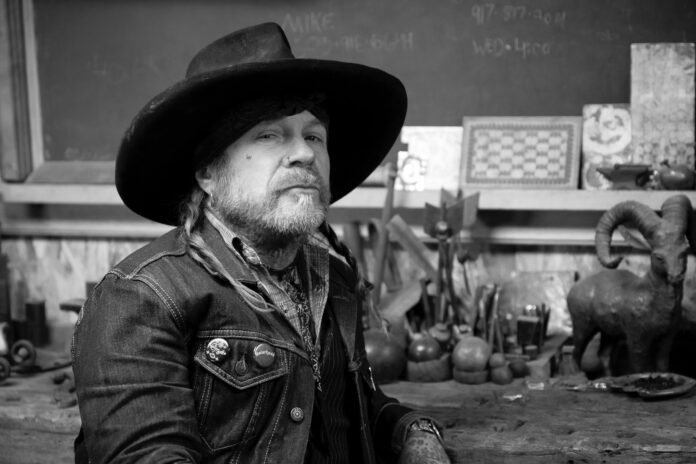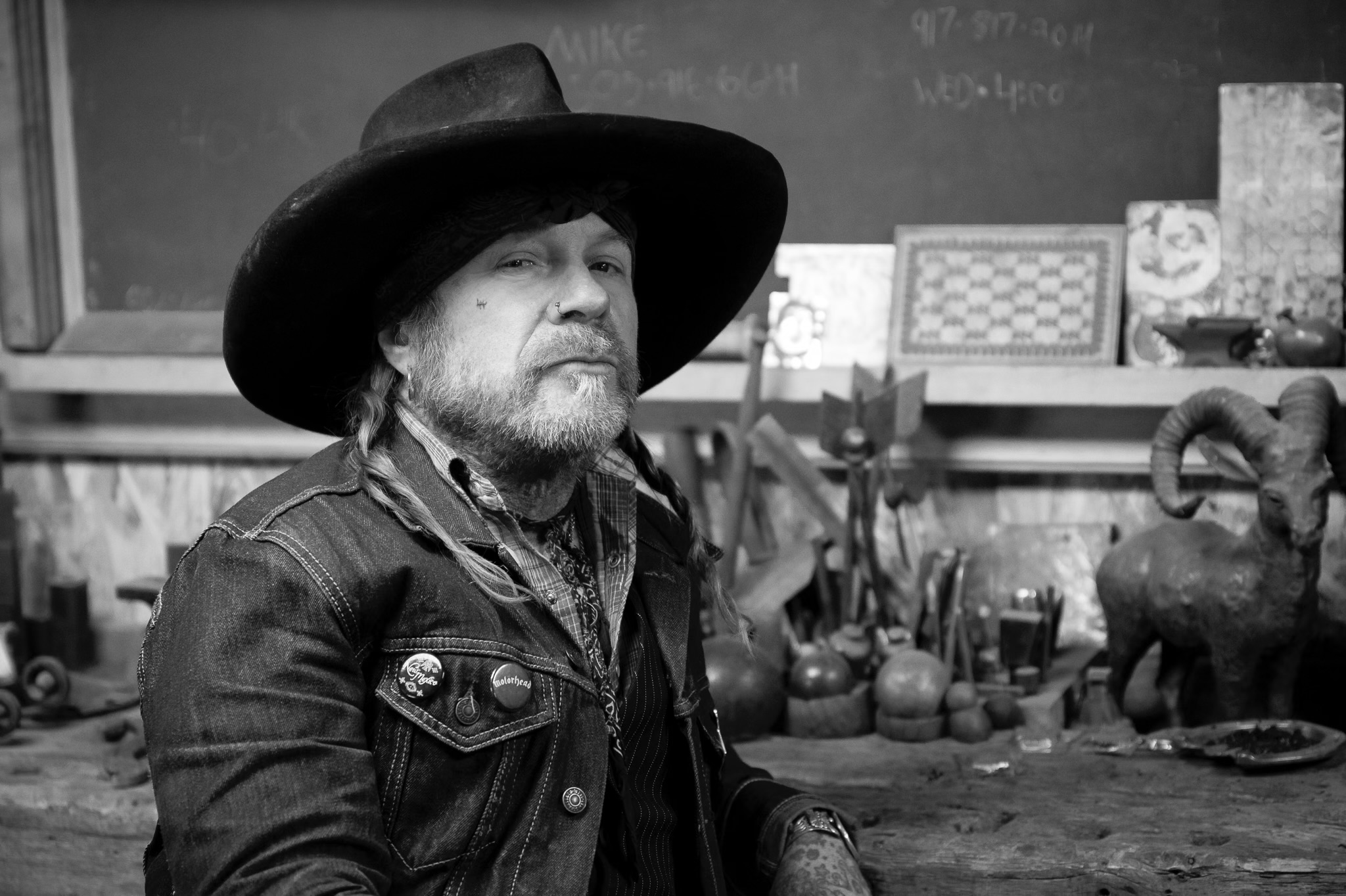
More from Spin:
- Counting Backwards: Our 1994 Counting Crows Feature
- Aerosmith Retiring From Touring Due To Steven Tyler Vocal Cord Injury
- Universal Lands Film Adaptation Of Britney Spears Memoir
The Highland Park neighborhood of Los Angeles has become a destination location. Billie Eilish and Finneas grew up here, but they are not the only attraction. The area’s main artery, the rapidly gentrifying York Boulevard, has a long stretch of kitschy, bohemian, owner-operated shops, restaurants, ice cream parlors, and pizza joints housed in the original period structures.
The tiny and tasteful Honeywood Vintage boutique, home to Lone Hawk Hats, is tucked in here. With its curated and distinct indigenous flavors, Honeywood feels like someone’s personal vanity room. The shop has been rearranged to allow for a performance setup and a small audience. Tonight at the Honeywood, Lone Hawk Hats milliner Charlie Overbey, who is also a longstanding musician and Southern California native, will be celebrating the release of his album, In Good Company, with an intimate show.
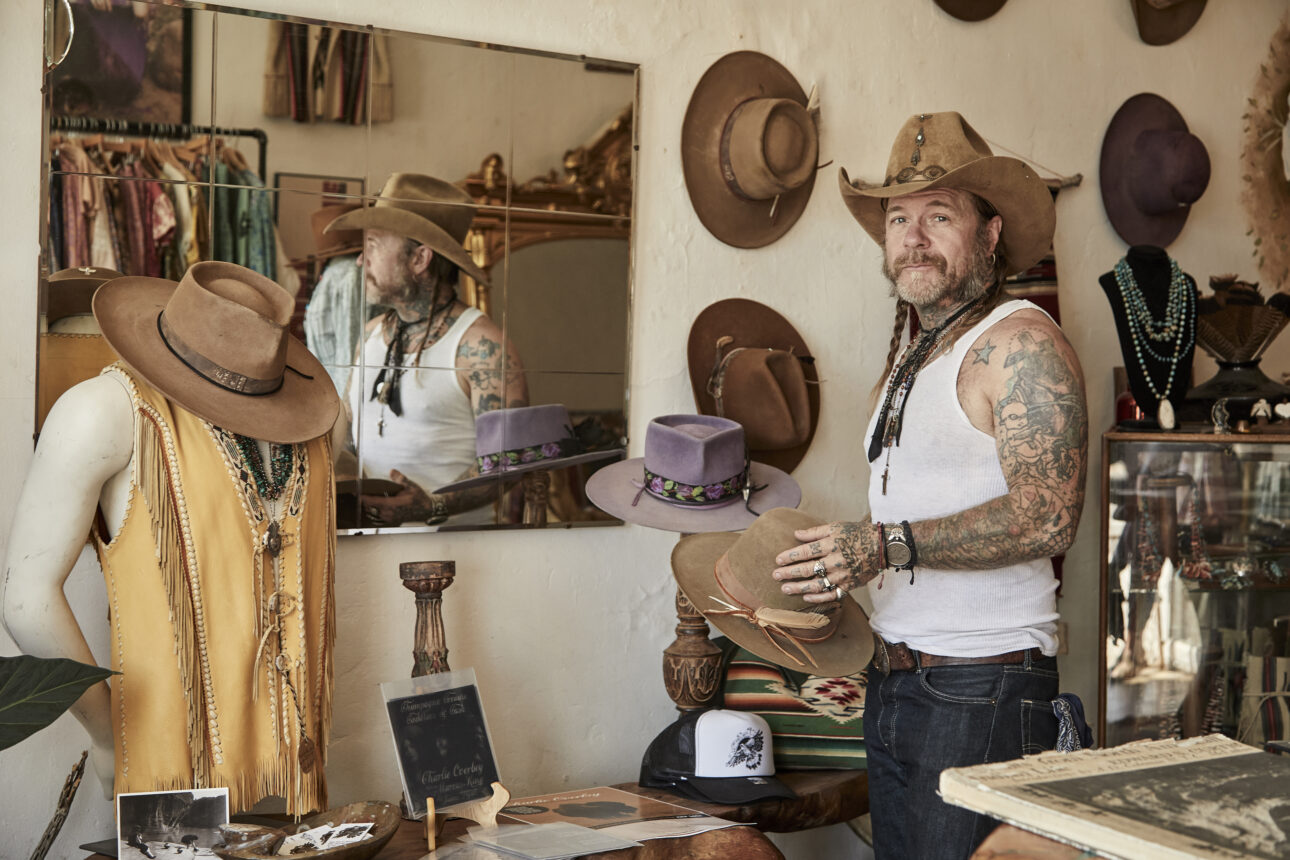
A small collection of Lone Hawk hats covers one wall of Honeywood. Each has a distinct personality and looks like it has a story to tell. These items are custom-made for the likes of Beyoncé and Sheryl Crow, and they are featured on the series 1883. A select few are embellished with hand embroidery by Vanessa Dingwell, Honeywood’s proprietor and Overbey’s partner.
As Charlie tells me, Lone Hawk Hats raised $100,000 during the pandemic for United Natives (aimed at New Mexico’s Navajo Nation population) by auctioning celebrity-donated hats. There is a months-long waiting list for a bespoke Lone Hawk hat, but Overbey keeps a few on hand in the Highland Park shop. You can also find some at the Honeywood location the couple has opened in their adopted home state of New Mexico.
It was during his ‘80s glam/hair metal era that Overbey got into the hat game. Initially it was because he wanted “flamboyant, crazy hats, and you couldn’t buy them.” Overbey adds, “I started doing my own hats. I bought hats that were big enough to work with and reshaped them and dressed them up.”
This method is still how Overbey makes his collectible hats. He uses bodies from the 1970s, or older, for their quality and the sustainability factor. Forgoing tools, Overbey handshapes these for hours every day, up to six days per hat. “I can get pinches and pulls you can’t get with a block,” he says. “It’s an artistic outlet for me as well, like sculpting.”
Naturally, Overbey is wearing one of his beautiful creations. Designed with elaborate detail, the hat has feathers, beads, and leather straps. It perches atop a black bandana tied in a knot on Overbey’s forehead. Two skinny braids trail over his shoulders, partially covering the white flowers on the lapels of his black vest. He sports a good number of chains around his neck, plus more leather straps. His black jeans have a generous rip. This goes well with his busted-up boots, whose distressed look is fantastic.
Overbey is projecting a look that matches the sonics and message of In Good Company. The roots rock album taps into all Overbey’s musical leanings: rock ‘n roll, cowpunk, outlaw, Americana. His decades of musicianship, his singular life experiences, his exposure to a variety of musical styles, and his wide-reaching musician friend group feed into In Good Company. “Champagne, Cocaine, Cadillacs & Cash” features Marcus King’s blues. “The Innocence” brings classic sensibilities from Nils Lofgren. The Wallflowers’ Stuart Mathis joins in on “Punk Rock Spy.” These are just a few of the namedropper-y musicians collected on the aptly titled album. Yet their presence somewhat detracts from the songs that Overbey has lived with, in some form or another, for years.
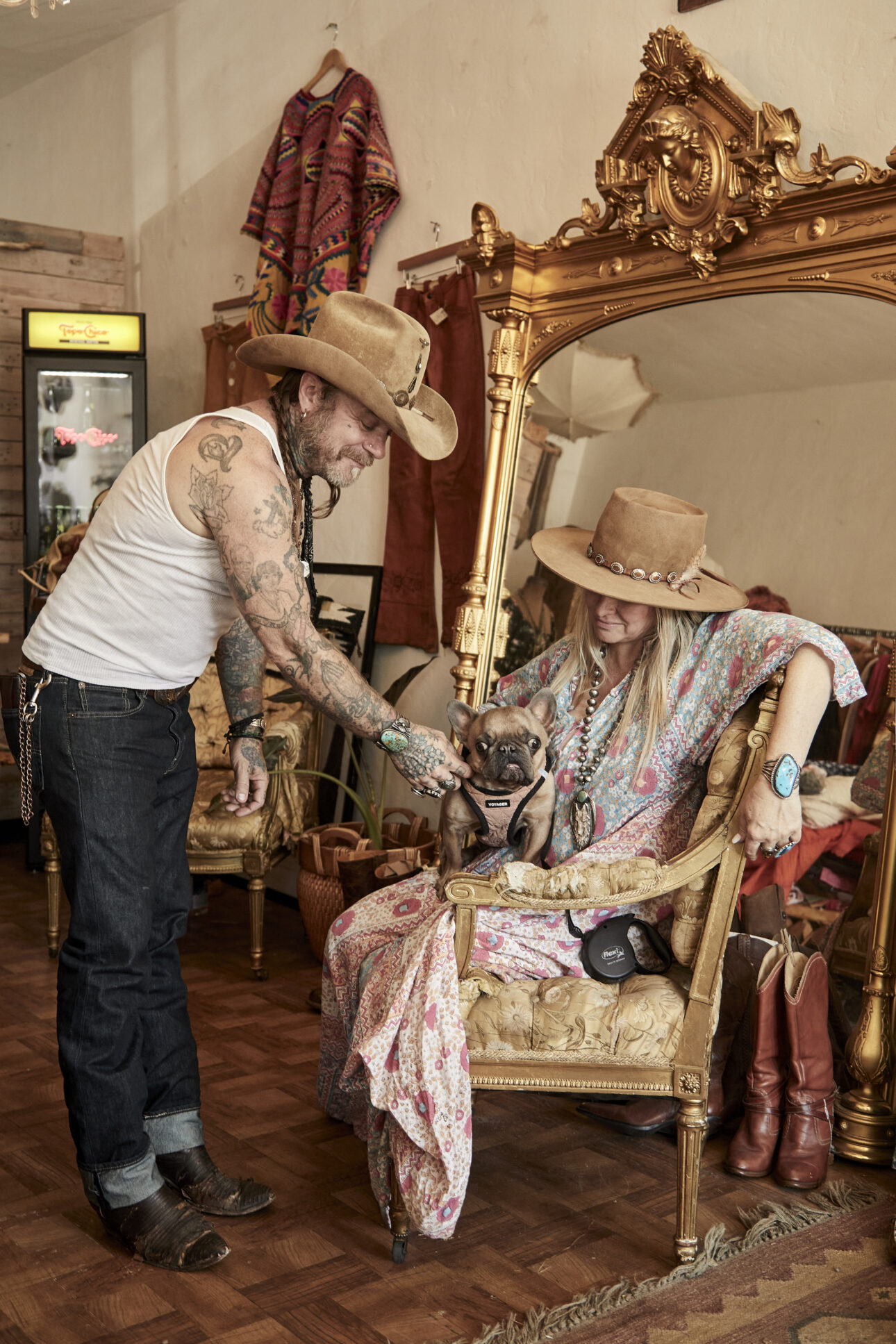
“My dad was a hillbilly from Arkansas, and my mom was British, literally off the boat from England,” says Overbey. “It was either Hee Haw or The Benny Hill Show on our TV. My dad played guitar, but the last thing I wanted to do at that age was play or listen to what my dad was doing. I got into punk, then rock ‘n’ roll then cowpunk. The transition into country was one I didn’t want to make when I was younger. But it was country with punk rock attitude, which was perfect. I always wrote songs that I said, ‘When I’m old enough, I’ll release these.’”
Four decades ago, Overbey, who had rebranded himself as Kit Ashley, was stomping up and down the Sunset Strip with long bleached and sprayed locks, heavy eyeliner, and a trashy wardrobe. He was “sponsored” (his term) by two strippers, which allowed him to focus on his glam/hair metal group, Big Bang Babies. The group formed just when the Strip was approaching its expiration date. Nonetheless, the late Bill Aucoin and Kenny Kerner stepped in to manage them.
By the time Big Bang Babies were ready to take off for Japan, where their song “Everybody Needs a Hero” had become the theme music for the Japanese soccer league, Nirvana took over. Overbey cut his hair and dyed it black. He left the group and focused on “cleaning my act up.” He adds, “To get off the nose candy, I got strung out on pills.” He returned to his hometown of La Habra, California, whose gang tag of “LH” is tattooed on Overbey’s cheek, except now it stands for “Lone Hawk.”
Over the years, Overbey joined and left various groups, and formed and dissolved a few musical projects: Custom Made Scare, Girls Crash Cars, Deadbolt, Charlie and the Dimestore Junkies, Charlie & The Valentine Killers, and Charlie Overbey and the Broken Arrows, to name a few. Meanwhile, he served a prison sentence, kept slipping into his partying ways, and to quote him, “was a bit of a mess.”
“My own worst enemy in those days,” admits Overbey. “I had to go on a ‘long vacation,’ but this one, I wasn’t allowed to leave. I was not left to my own devices. I was kept under lock and key, so to speak.”
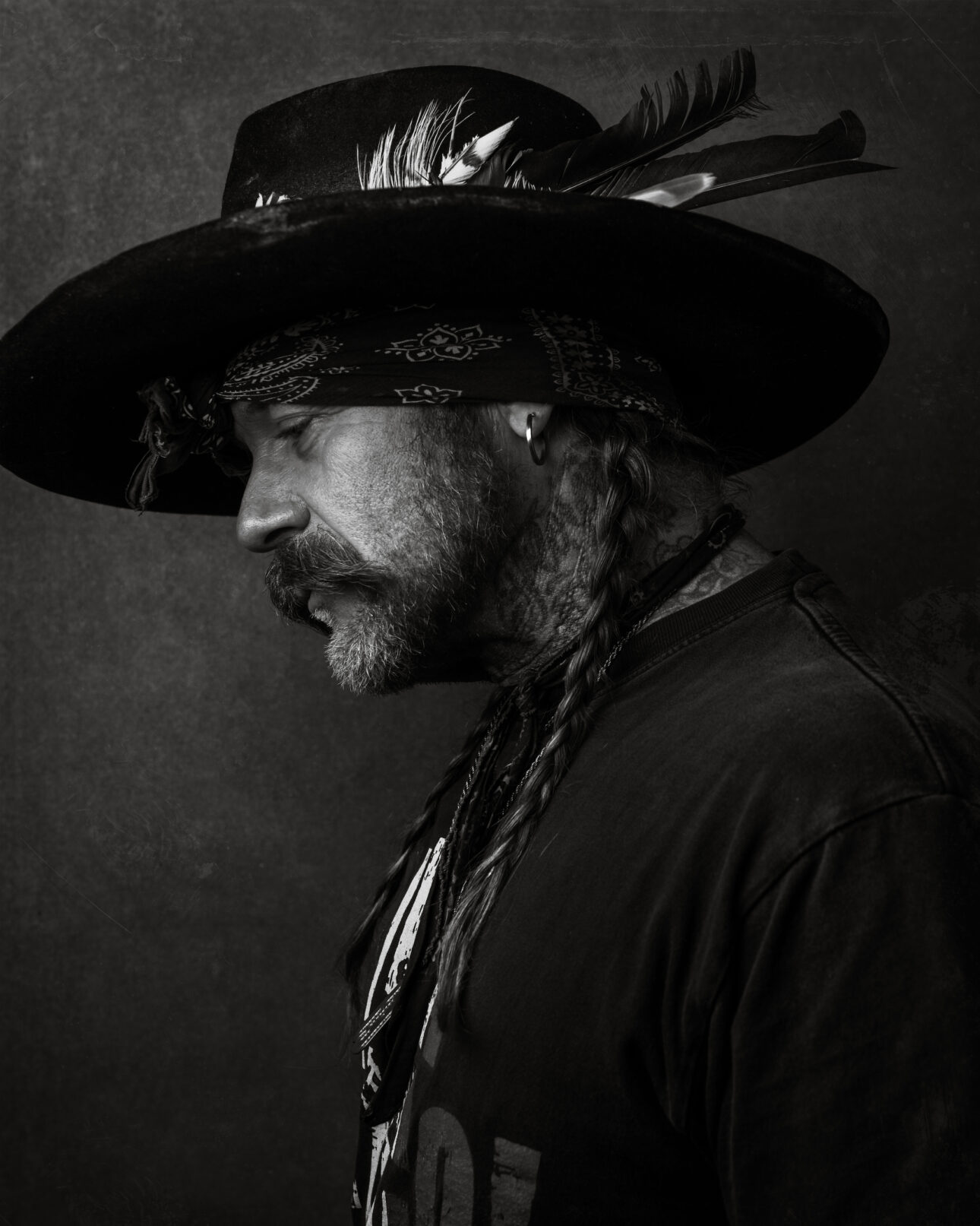
With different bands, Overbey played gigs with the likes of Social Distortion, Motörhead, Foo Fighters, and Blackberry Smoke all over the globe. While in Europe in the early 2000s, he decided to stay in Berlin. He opened a bar on the east side of the city, and, of course, fell off the wagon. He returned home to dry out and became Pat Smear’s roommate. He had a daughter, Katie Overbey—who, at 18 years of age, bears an unsettling resemblance to Kit Ashley—an accomplished musician in her own right.
Overbey never stopped writing or releasing music. But there were many songs he held on to, waiting for the right moment to unleash them to the public. In Good Company collects songs that go as far back as the 1990s: “Stuck in This Town” and his Berlin years, “Dear Captain” and “Miss Me.” They are reimagined and remolded to connect with how Overbey feels at this point in his life, in his late 50s.
“It’s a natural progression as a songwriter to want to write songs that are more heartfelt, deliver more of a message than singing about trucks and girls and beer and whiskey,” says Overbey. “I always played acoustic guitar. To start wanting to make records with real songs, real meaning, and real messages was an easy entrance for me. I’m just an old punker that’s still writing songs that aren’t punk—sorta. The attitude is still there in some of them, but it’s not an angry punk attitude.”
Overbey is far from angry, but he still is kind of a punk. He sticks his head into Arroyo Records next door to Honeywood and makes a beeline for the punk bin and an Adolescents album. He takes a longer walk down the street, bypassing all the Mexican food on offer, to order tacos from “the best taco truck in the city” and walks back with a fragrant bag. After lunch he stops by Vintage Tattoo Art Parlor, where the world-famous Baba inks, to get a small “3” tattooed on his hand—the only available skin space left—marking In Good Company as the third album he has released under his own name.
As it gets closer to soundcheck time, the excitement, and tension, for tonight’s show ramps up. Overbey’s daughter Katie arrives, ready to provide vocals and play violin in her father’s band. She is friendly, personable, and winning—qualities she likely inherited from her father, but without the muddying elements that derailed him time and time again. When Katie joins Overbey, Miranda Lee Richards, Matt Pynn (pedal steel and lap steel) and Micky Madden (guitar and mandolin) for this special performance—for which he is playing his father’s guitar, it feels like the perfect full-circle moment.
To see our running list of the top 100 greatest rock stars of all time, click here.

